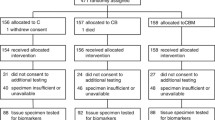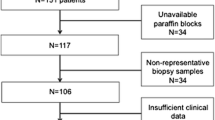Abstract
Endothelin-1 (ET-1) and asymmetric dimethylarginine (ADMA) play a major role in tumor growth and metastasis. Our aim was to determine whether there is any association between these endothelial parameters and tumor markers with the clinical outcome of bevacizumab-treated metastatic colorectal cancer (mCRC) patients in terms of response and survival. Pretreatment serum levels of ET-1, ADMA, carcinoembryonic antigen (CEA), and carbohydrate antigen (CA) 19-9 were measured in 36 chemotherapy-naive mCRC patients treated with first-line bevacizumab-based therapy. Additionally, after first cycle of treatment, serum levels of these parameters were reanalyzed. Lower baseline serum ET-1 and ADMA levels were observed in patients responding to bevacizumab-based treatment (respectively, p = 0.037, p = 0.034). Median progression-free survival (PFS) (11 vs. 6 months, p = 0.012) and overall survival (OS) (28 vs 9 months; p = 0.007) were significantly shorter in patients with high pretreatment ET-1 levels. There was a significant decrease in ET-1 and CEA levels after first treatment (p = 0.020, p = 0.012), while ADMA and CA 19-9 levels were not significantly changed. Patients with decreased posttreatment ET-1 levels were shown to have inferior PFS (6 vs 11 months, p = 0.022), but no statistically significant difference was shown with respect to OS (p = 0.141). The effect of bevacizumab on endothelin axis including the biologic basis of decreasing ET-1 levels due to bevacizumab treatment and its association with inferior outcome has to be clarified in prospective trials.




Similar content being viewed by others
References
Fuchs CS, Marshall J, Barrueco J. Randomized, controlled trial of irinotecan plus infusional, bolus, or oral fluoropyrimidines in first-line treatment of metastatic colorectal cancer: updated results from the BICC-C study. J Clin Oncol. 2008;26:689.
Giantonio BJ, Catalano PJ, Meropol NJ, O’Dwyer PJ, Mitchell EP, Alberts SR, Schwartz MA, Benson AB 3rd. Bevacizumab in combination with oxaliplatin, fluorouracil, and leucovorin (FOLFOX4) for previously treated metastatic colorectal cancer: results from the Eastern Cooperative Oncology Group Study E3200. J Clin Oncol. 2007;25:1539–44.
Lievre A, Samalin E, Mitry E, Assenat E, Boyer-Gestin C, Lepere C, Bachet JB, Portales F, Vaillant JN, Ychou M, Rougier P. Bevacizumab plus FOLFIRI or FOLFOX in chemotherapy-refractory patients with metastatic colorectal cancer: a retrospective study. BMC Cancer. 2009;9:347.
Ellis LM, Hicklin DJ. Pathways mediating resistance to vascular endothelial growth factor-targeted therapy. Clin Cancer Res. 2008;14:6371–5.
Shojaei F, Ferrara N. Role of the microenvironment in tumor growth and in refractoriness/resistance to anti-angiogenic therapies. Drug Resist Updates. 2008;11:219–30.
Wulfing P, Kersting C, Tio J, Fischer RJ, Wulfing C, Poremba C, Diallo R, Bocker W, Kiesel L. Endothelin-1-, endothelin-A-, and endothelin-B-receptor expression is correlated with vascular endothelial growth factor expression and angiogenesis in breast cancer. Clin Cancer Res. 2004;10:2393–400.
Spinella F, Rosano L, Di Castro V, Natali PG, Bagnato A. Endothelin-1 induces vascular endothelial growth factor by increasing hypoxia-inducible factor 1α in ovarian cancer cells. J Biol Chem. 2002;277:27850–5.
Salani D, Taraboletti G, Rosano L, Di Castro V, Borsotti P, Giavazzi R, Bagnato A. Endothelin-1 induces an angiogenic phenotype in cultured endothelial cells and stimulates neovascularization in vivo. Am J Pathol. 2000;157:1703–11.
Del Bufalo D, Di Castro V, Biroccio A, Varmi M, Salani D, Rosano L, Triciuoglio D, Spinella F, Bagnato A. Endothelin-1 protects ovarian carcinoma cells against paclitaxel-induced apoptosis: requirement for Akt activation. Mol Pharmacol. 2002;61:524–32.
Rosano L, Varmi M, Salani D, Di Castro V, Spinella F. Natali PG, bagnato A: endothelin-1 induces tumor proteinase activation and invasiveness of ovarian carcinoma cells. Cancer Res. 2001;61:8340–6.
Grimshaw MJ. Endothelins and hypoxia-inducible factor in cancer. Endocr Relat Cancer. 2007;14:233–44.
Wülfing P, Tio J, Kersting C, Sonntag B, Buerger H, Wülfing C, Euler U, Boecker W, Tulusan AH, Kiesel L. Expression of endothelin-A-receptor predicts unfavourable response to neoadjuvant chemotherapy in locally advanced breast cancer. Br J Cancer. 2004;2(91):434–40 (PMID: 15226779).
Cooke JP. Asymmetrical dimethylarginine: the Uber marker? Circulation. 2004;109:1813–8.
Zoccali C, Bode-Boger S, Mallamaci F, Benedetto F, Tripepi G, Malatino L, Cataliotti A, Bellanuova I, Fermo I, Frolich J, Boger R. Plasma concentration of asymmetrical dimethylarginine and mortality in patients with end-stage renal disease: a prospective study. Lancet. 2001;358:2113–7.
Sulicka J, Surdacki A, Strach M, Kwater A, Gryglewska B, Ćwiklińska M, Balwierz W, Grodzicki TK. Elevated asymmetric dimethylarginine in young adult survivors of childhood acute lymphoblastic leukemia: a preliminary report. Dis Markers. 2012;33:69–76.
Alacacioglu A, Kebapcilar L, Sari I, Gokgoz Z, Tarhan O, Somali I, Yuksel A, Bozkaya G, Sop G. Taxane-based adjuvant chemotherapy reduces endothelin-1 and symmetric dimethylarginine levels in patients with breast cancer. J BUON. 2010;15:572–6.
Szuba A, Chachaj A, Wróbel T, Dzietczenia J, Mazur G, Antonowicz-Juchniewicz J, Kuliczkowski K, Andrzejak R. Asymmetric dimethylarginine in hematological malignancies: a preliminary study. Leuk Lymphoma. 2008;49:2316–20.
Kostourou V, Robinson SP, Cartwright JE, Whitley GS. Dimethylarginine dimethylaminohydrolase I enhances tumour growth and angiogenesis. Br J Cancer. 2002;9(87):673–80.
Zid M, Drouin G. Gene conversions are under purifying selection in the carcinoembryonic antigen immunoglobulin gene families of primates. Genomics. 2013;102:301–9.
Koprowski H, Steplewski Z, Michell K. Colorectal carcinoma antigens detected by hybridoma antibodies. Somat Cell Genet. 1979;5:957–62.
Amri R, Bordeianou LG, Sylla P, Berger DL. Preoperative carcinoembryonic antigen as an outcome predictor in colon cancer. J Surg Oncol. 2013;108:14–8.
Reiter W, Stieber P, Reuter C, Nagel D, Lau-Werner U, Lamerz R. Multivariate analysis of the prognostic value of CEA and CA19-9 serum levels in colorectal cancer. Anticancer Res. 2000;20:5195–8.
Saltz LB, Clarke S, Díaz-Rubio E, Scheithauer W, Figer A, Wong R, Koski S, Lichinitser M, Yang TS, Rivera F, Couture F, Sirzén F, Cassidy J. Bevacizumab in combination with oxaliplatin-based chemotherapy as first-line therapy in metastatic colorectal cancer: a randomized phase III study. J Clin Oncol. 2009;27(4):653 (PMID 18421054).
de Gramont A, Figer A, Seymour M, Homerin M, Hmissi A, Cassidy J, Boni C, Cortes-Funes H, Cervantes A, Freyer G, Papamichael D, Le Bail N, Louvet C, Hendler D, de Braud F, Wilson C, Morvan F, Bonetti A. Leucovorin and fluorouracil with or without oxaliplatin as first-line treatment in advanced colorectal cancer. J Clin Oncol. 2000;18(16):2938–47.
Pectasides D, Papaxoinis G, Kalogeras KT, Eleftheraki AG, Xanthakis I, Makatsoris T, Samantas E, Varthalitis I, Papakostas P, Nikitas N, Papandreou CN, Pentheroudakis G, Timotheadou E, Koutras A, Sgouros J, Bafaloukos D, Klouvas G, Economopoulos T, Syrigos KN, Fountzilas G. XELIRI-bevacizumab versus FOLFIRI-bevacizumab as first-line treatment in patients with metastatic colorectal cancer: a Hellenic Cooperative Oncology Group phase III trial with collateral biomarker analysis. BMC Cancer. 2012;29(12):271.
Nelson J, Bagnato A, Battistini B, Nisen P. The endothelin axis: emerging role in cancer. Nat Rev Cancer. 2003;3:110–6.
Rosanò L, Spinella F, Di Castro V, Nicotra MR, Dedhar S, de Herreros AG, Natali PG, Bagnato A. Endothelin-1 promotes epithelial-to-mesenchymal transition in human ovarian cancer cells. Cancer Res. 2005;15(65):11649–57.
Nelson JB, Udan MS, Guruli G, Pflug BR. Endothelin-1 inhibits apoptosis in prostate cancer. Neoplasia. 2005;7:631–7.
Knowles J, Loizidou M, Taylor I. Endothelin-1 and angiogenesis in cancer. Curr Vasc Pharmacol. 2005;3:309–14.
Liakou P, Tepetes K, Germenis A, Leventaki V, Atsaves V, Patsouris E, Roidis N, Hatzitheophilou K, Rassidakis GZ. Expression patterns of endothelin-1 and its receptors in colorectal cancer. J Surg Oncol. 2012;105:643–9.
Nie S, Zhou J, Bai F, Jiang B, Chen J, Zhou J (2013). Role of endothelin a receptor in colon cancer metastasis: In vitro and in vivo evidence. Mol Carcinog [Epub ahead of print].
Abdel-Gawad IA, Hassanein HM, Bahgat NA, Abdel SM, El-Sissy AH, Altaweel MA, Helal AM. Study of endothelin-1 and vascular endothelial growth factor in patients with cancer colon. J Egypt Natl Cancer Inst. 2008;20:216–23.
Eberl LP, Egidy G, Pinet F, Juillerat-Jeanneret L. Endothelin receptor blockade potentiates FasL-induced apoptosis in colon carcinoma cells via the protein kinase C-pathway. J Cardiovasc Pharmacol. 2000;36:354–6.
Miller K, Moul JW, Gleave M, Fizazi K, Nelson JB, Morris T, Nathan FE, McIntosh S, Pemberton K, Higano CS. Phase III, randomized, placebo-controlled study of once-daily oral zibotentan (ZD4054) in patients with non-metastatic castration-resistant prostate cancer. Prostate Cancer Prostatic Dis. 2013;16:187–92.
Cognetti F, Bagnato A, Colombo N, Savarese A, Scambia G, Sehouli J, Wimberger P, Sorio R, Harter P, Mari E, McIntosh S, Nathan F, Pemberton K, Baumann K. A Phase II, randomized, double-blind study of zibotentan (ZD4054) in combination with carboplatin/paclitaxel versus placebo in combination with carboplatin/paclitaxel in patients with advanced ovarian cancer sensitive to platinum-based chemotherapy (AGO-OVAR 2.14). Gynecol Oncol. 2013;130:31–7.
Bagnato A, Loizidou M, Pflug BR, et al. Role of the endothelin axis and its antagonists in the treatment of cancer. Br J Pharmacol. 2011;163:220–33.
de Jesus-Gonzalez N, Robinson E, Penchev R, von Mehren M, Heinrich MC, Tap W, Wang Q, Demetri G, George S, Humphreys BD. Regorafenib induces rapid and reversible changes in plasma nitric oxide and endothelin-1. Am J Hypertens. 2012;25:1118–23.
Kappers MH, van Esch JH, Sluiter W, Sleijfer S, Danser AH, van den Meiracker AH. Hypertension induced by the tyrosine kinase inhibitor sunitinib is associated with increased circulating endothelin-1 levels. Hypertension. 2010;56:675–81.
Said N, Smith S, Sanchez-Carbayo M, Theodorescu D. Tumor endothelin-1 enhances metastatic colonization of the lung in mouse xenograft models of bladder cancer. J Clin Invest. 2011;121:132–47.
Conflict of interest
None.
Author information
Authors and Affiliations
Corresponding author
Rights and permissions
About this article
Cite this article
Dirican, A., Kucukzeybek, Y., Alacacioglu, A. et al. Impact of pre-angiogenic factors on the treatment effect of bevacizumab in patients with metastatic colorectal cancer. Med Oncol 31, 905 (2014). https://doi.org/10.1007/s12032-014-0905-8
Received:
Accepted:
Published:
DOI: https://doi.org/10.1007/s12032-014-0905-8




